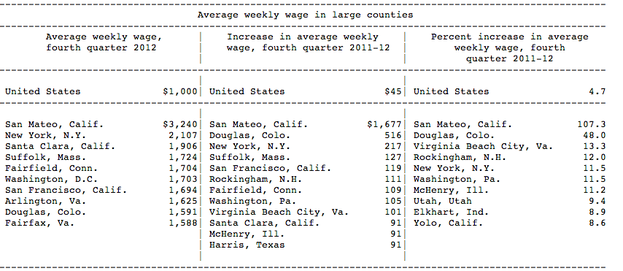How Facebook Single-Handedly Made Silicon Valley Richer Than Manhattan
The average weekly wage in San Mateo County California, the home of Silicon Valley behemoths like Facebook, increased 107.3 percent in the last quarter of 2012, making it the richest place in America — even ahead of Manhattan — all because of a little IPO that happened in May 2012. Here's how the thinking goes: Facebook went public in May 2012. In November — 181 days after the offering — those with vested stock options could cash in. Sure, CEO Mark Zuckerberg promised not do that. But if Peter Thiel, one of the earliest and biggest investors in the social network took out something like $1 billion, you can bet some less famous names did as well. In that quarter alone, the roughly 6,200 tech workers in the area collected total wages of $6.8 billion, notes the Wall Street Journal's Scott Thurm. "That kind of a jump can only be explained by what’s happening with stock" Doug Henton, chief executive of Collaborative Economics told Thurm. Some of that likely also came from other tech IPOs that year, but Facebook's was by far the largest.
RELATED: Walmart's Facebook and Twitter-Powered Future
So now it can boast higher earnings than even Manhattan, home of Wall Street, which is in second place on the Bureau of Labor and Statistics rankings, at weekly wages of $2,107 for the quarter — over $1,000 less than the Facebook billionaires.
RELATED: The Bad News-Good News of Tech Trademark Infringement
RELATED: Americans Take Their Zodiac Signs Really, Really Seriously
Another huge jump in weekly wage earning — though not nearly as impressive at 107.3 percent — happened in Douglas county in Colorado, a suburb outside of Denver. Though no big tech company IPOs happened at the end of last quarter, the area does have some big name companies in growth industries like healthcare and telecommunications.
RELATED: Facebook's News Feed Will Probably Make a Lot of People Angry
Now that San Mateo Co. has so many super-duper rich people, what will happen to the local economy? "It will be interesting to see if that wealth bump is reflected in giving back to the community," wondered Henton. That's a nice thought, but not one that's likely to result in anything. The gap between the rich and the poor in the South Bay continues to grow, with food stamp participation at a 10 year high and poverty for blacks and hispanics reaching new lows. If anything, the influx of money will only make things worse, with the cost of living soaring to reflect the new riches, pushing middle class people up. But hey, maybe the newly civic minded CEOs, with Zuckerberg leading the pack, will decide to do something about it now?



